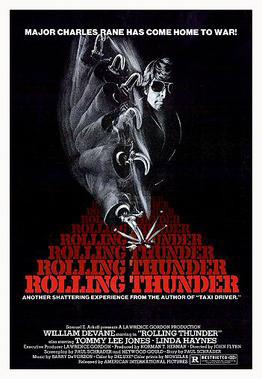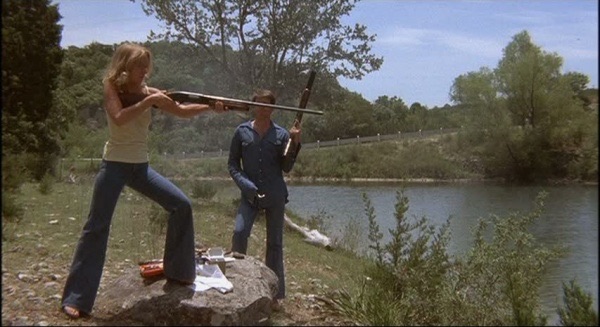

I’ve read online that this is a movie Tarantino digs. Well, it is in parts very violent. And it’s a bit grindhouse, I suppose. But it’s also quite slow moving in parts, and fairly basic in execution.
It’s also part of what is now a massive part of the mainstream, what I’m going to call vigilante ‘revenge porn’. And that’s nothing new. A lot of Westerns are revenge based. At least the premise – two ‘Nam vets, both POWs, finally return home, and can’t assimilate – is reasonably well handled.
In fact that’s the best part of the film; exploring the fall-out from a soldier returning home to a dysfunctional, disintegrating and disappointing civilian life.
Layer on there’s a hillbilly-gangster home-invasion scene, which is pretty rough. And that’s kind of what sets up the film’s raison d’etre. It’s perhaps a bit far-fetched? But the brutality is delivered in such a basic way it does still shock.
And from there on in it gets stuck into the anger and violence, only very mildly leavened by a bit of family banality, with a young Tommy Lee Jones’ family, and Linda (played by Linda Haynes), Major Zane’s post family-massacre squeeze.
I like William Devane, as Maj. Rane, despite the rather clichéd taciturn tough guy vibe. He has sufficient grit and charisma to carry the part. TLJ, young and square jawed, is a much less developed character, almost robotically blank, in a way suggestive of prior sociopathic tendencies, in addition to post ‘Nam PTSD.

There’s a character called Cliff – he shacks up with Rane’s wife in the latter’s absence, and (inexplicably and with absolutely no tact) calls Rane’s son ‘runt’! I wrongly assumed he was being set up to be Rane’s first kill.
Personally I think the movie makers missed a trick or two in how they handled both Linda’s and Cliff’s roles in the film.
And then there’s the Mexican whorehouse denouement. This whole type scene has in itself now become something of a cliché. Maybe back in ‘77 it was a fresher idea? But there are a lot of aspects of this ending that feel half-arsed or somewhat disappointing.
And the very ending is pretty abrupt and unsatisfactory. And yet, it was an ok watch. Hardly classic. But compelling enough to want to finish.
As a postscript, it feels to me like a fairly poor riff on Scorsese’s far bleaker and far superior Taxi Driver, of 1976. So much so, I think I’ll watch the latter again, to refresh my memory. In fact it turns out that the two films share Paul Schrader, as screenwriter.
